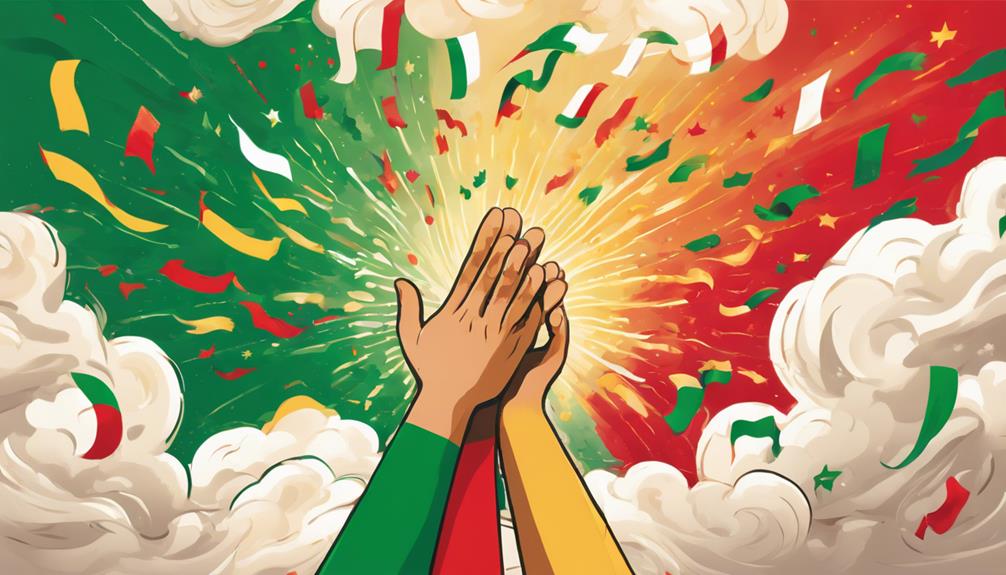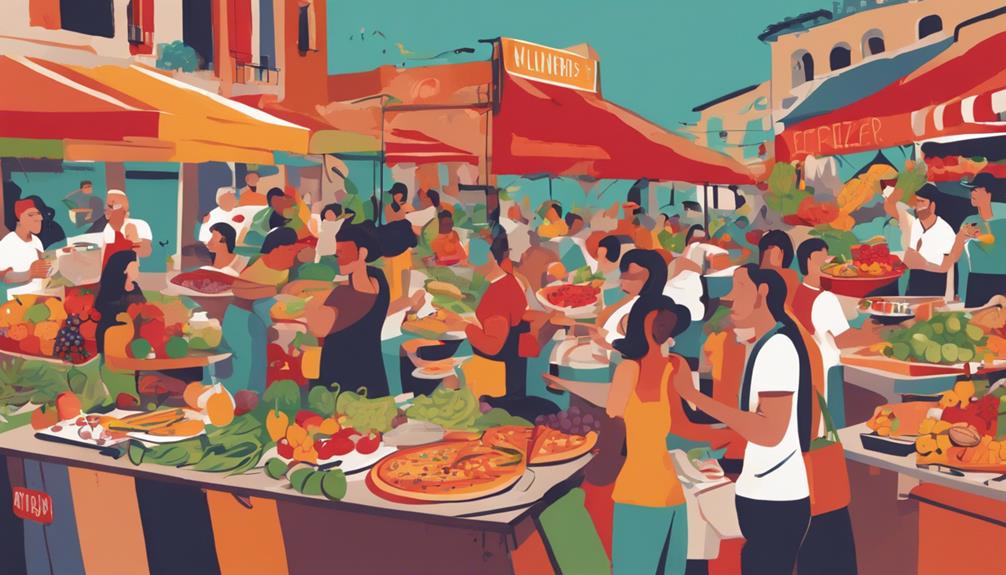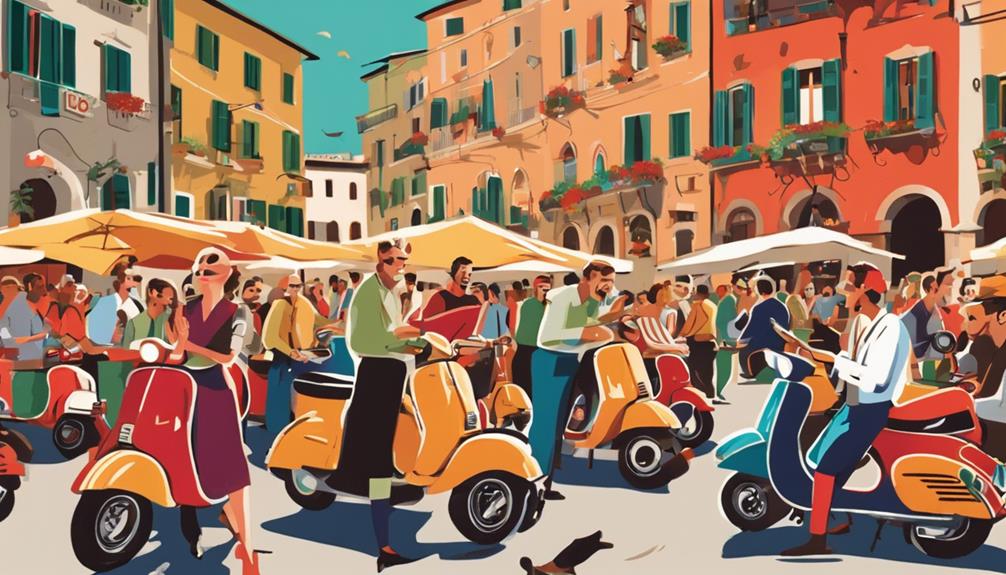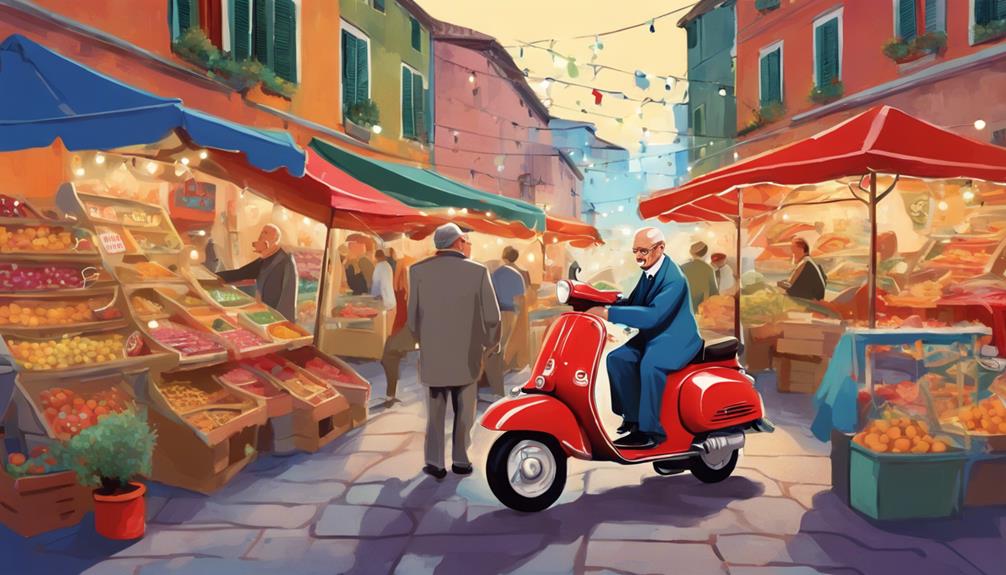You're about to discover the vibrant world of Italian slang, which makes up around 20% of everyday conversations in Italy. With two distinct Italy's – north and south – regional dialects, idioms, and expressions can be quite different from standard Italian. Mastering essential slang phrases like "Ciao, bello!" and "Che figo!" will help you navigate everyday situations with confidence. Understanding slang for emotions, food, and drink, as well as common gestures, will allow you to connect with locals on a deeper level. As you explore Italian slang further, you'll uncover a rich cultural tapestry waiting to be unraveled.
Key Takeaways
- Mastering Italian slang phrases helps navigate everyday situations and build connections with locals, making conversations sound more natural and confident.
- Regional dialects have unique slang, idioms, and expressions that may not be familiar to outsiders, so recognizing and respecting regional variations is essential.
- Italian idioms and expressions add flavor to conversations, allowing for sounding more natural and authentic, and understanding idioms helps better comprehend everyday conversations.
- Food and drink slang is an integral part of Italian culture, with terms like "caffè" (espresso), "cappuccino," and "panino" (sandwich) being essential to navigate everyday situations.
- Mastering Italian slang in context, through literature, music, and everyday conversations, helps sound like a native and understand Italian culture more deeply.
North Vs. South: Regional Slang

Two distinct Italy's exist, one above and one below the imaginary line that divides the country into northern and southern regions.
You'll notice that the way Italians speak varies greatly between these two areas. Regional dialects are a significant aspect of Italian culture, and they can be quite different from standard Italian.
In the north, you'll hear dialects like Lombard, Piedmontese, and Venetian, which are often mutually unintelligible with standard Italian. In the south, you'll encounter dialects like Neapolitan, Sicilian, and Calabrian, which are also distinct from standard Italian.
Language barriers can arise when communicating across regions.
For instance, a northerner might struggle to understand a southerner's dialect, and vice versa. This can lead to misunderstandings and miscommunications. Additionally, regional dialects often have unique slang, idioms, and expressions that may not be familiar to outsiders.
As you navigate Italy, you'll need to be aware of these regional differences to effectively communicate and avoid confusion. By recognizing and respecting these regional variations, you'll be better equipped to connect with locals and appreciate the rich cultural diversity of Italy.
Essential Italian Slang Phrases
Mastering essential Italian slang phrases will help you navigate everyday situations, build connections with locals, and add a touch of authenticity to your interactions. Italian colloquialisms are an integral part of everyday expressions, and learning them will make you sound more natural and confident in your conversations.
| Italian Slang Phrase | English Translation |
|---|---|
| Ciao, bello! | Hi, handsome! (used to greet friends) |
| Come stai? | How are you? |
| Sto bene, grazie | I'm fine, thank you |
| Che figo! | How cool! (used to express admiration) |
| Ci vediamo dopo | See you later |
These essential phrases will help you communicate effectively in everyday situations, from greeting friends to asking about someone's well-being. Using Italian colloquialisms will also show locals that you're making an effort to understand their culture and language. By incorporating these phrases into your vocabulary, you'll be able to navigate everyday situations with confidence and build stronger connections with the people you meet.
Slang for Emotions and Feelings

When traversing the intricacies of Italian relationships, being able to express your emotions and feelings in a way that resonates with locals can make all the difference.
Mastering the slang for emotions and feelings is vital to avoid being misunderstood or, worse, coming across as insincere. Italians are known for being dramatic, so mastering the art of expressing yourself in a way that's authentic and relatable is pivotal.
Feeling frustrato (frustrated) is a common emotion in Italy, especially when dealing with bureaucracy or traffic.
You'll often hear Italians exclaim "Sono cosí frustrato!" (I'm so frustrated!) or simply "Frustrato!" to convey their emotions.
On the other hand, when Italians are excited or happy, they'll exclaim "Sono cosí emozionato!" (I'm so excited!) or "Sono felice!" (I'm happy!).
Mastering these emotional expressions will help you connect with locals on a deeper level and build stronger relationships.
Italian Idioms and Expressions
Many Italian idioms and expressions add flavor to conversations, allowing you to sound more natural and authentic in your interactions with locals.
You'll find that idiomatic language origins date back to ancient times, with many expressions derived from Latin, Greek, and other languages that influenced the Italian language. Italian dialect differences also play a significant role in shaping regional idioms, with some expressions being unique to specific regions.
For instance, "In bocca al lupo" (good luck) is a common idiom used throughout Italy, while "Fatta la legge, trovato l'inganno" (make a law, find a loophole) is more commonly used in the northern regions.
Understanding these idioms and expressions will help you better comprehend everyday conversations and even allow you to throw in a few witty remarks of your own. By incorporating these expressions into your language repertoire, you'll be able to connect with locals on a deeper level and navigate everyday situations with ease.
Slang for Food and Drink

Food is a staple of Italian culture, and slang surrounding it's no exception.
You'll quickly find yourself immersed in Italy's foodie heaven, where every meal is a celebration.
When it comes to coffee, Italy is renowned for its coffee culture. You'll hear locals ordering a "caffè" (espresso) or "cappuccino" in the morning, and a "macchiato" in the afternoon.
Don't be surprised if you're asked if you want "zucchero" (sugar) or "latte" (milk) with your coffee.
For food, "panino" is a sandwich, "pizza al taglio" is a slice of pizza, and "gelato" is a must-try.
If you're feeling hungry, you might hear someone say "sto morendo di fame" (I'm starving).
When dining out, "conto, per favore" means "check, please."
If you want to try something authentic, look for "osteria" or "trattoria," which serve traditional Italian cuisine.
Remember, in Italy, food isn't just a necessity, it's a way of life.
Common Italian Gestures
Three key aspects of Italian culture – food, family, and gestures – are deeply intertwined. As you interact with Italians, you'll notice that hand talking is an essential part of their communication. It's not just about speaking; non-verbal cues play a significant role in conveying emotions and ideas. Italians use gestures to emphasize points, express emotions, and even tell stories.
Here is a breakdown of some common Italian gestures:
| Gesture | Meaning | When to Use |
|---|---|---|
| Mano a borsa (handbag hand) | You're saying something is expensive | When discussing prices or costs |
| Fare una fica (fig hand) | Good luck or protection | When saying goodbye or parting ways |
| Stringere i pugni (clenched fists) | Determination or frustration | When expressing strong emotions |
| Tilted head | Curiosity or interest | When asking questions or seeking clarification |
| Waving goodbye | Farewell or goodbye | When parting ways or saying goodbye |
Mastering Italian Slang in Context

As you plunge deeper into the world of Italian culture, mastering slang in context becomes essential to sounding like a native.
You'll discover that slang is woven into the fabric of everyday conversations, literature, and music. Slang in literature, for instance, adds a layer of authenticity to characters and their dialogue.
Authors like Alessandro Baricco and Andrea Camilleri skillfully incorporate regional slang to create vivid, relatable characters. When reading Italian literature, pay attention to how slang is used to convey emotions, attitudes, and social status.
In music, slang is often used to create catchy lyrics and rhymes. Italian rappers and songwriters like Fabri Fibra and Emma Marrone frequently incorporate slang to give their songs a more urban, contemporary feel.
Listen to Italian music and try to identify the slang words and phrases used in the lyrics. By doing so, you'll gain a deeper understanding of the language and its cultural nuances.
Frequently Asked Questions
Can I Use Italian Slang in Formal Writing or Business Settings?
When writing for formal or business settings, you should generally avoid using slang, as it can come across as unprofessional.
In business communication, cultural nuances play a significant role, and using informal language can detract from the gravity of your message.
Your online presence should exude formality, conveying expertise and authority.
While Italian slang might be colorful, it's best to stick with standard Italian or English in formal writing to guarantee clarity and respect for your audience.
How Do I Pronounce Italian Slang Words Correctly?
Imagine unsealing a treasure chest, and inside, you find the key to pronouncing words like a native.
To master the pronunciation of Italian slang words, you'll need to ponder the regional dialect influence.
For instance, words from the south might've a softer pronunciation, while those from the north might be more guttural.
Be careful not to confuse similar-sounding words or over-emphasize syllables – common mistakes that can make you sound like a foreigner.
With practice and attention to detail, you'll be speaking like a local in no time!
Are There Any Italian Slang Words That Are Inappropriate?
When exploring foreign languages, you'll inevitably stumble upon words and phrases that are considered taboo or off-limits.
In Italian, there are certain phrases and idioms that are best avoided, especially in polite conversation.
You'll want to steer clear of forbidden idioms that can offend or embarrass, like those related to politics, religion, or bodily functions.
Be mindful of Italian taboo phrases that can land you in hot water, and instead focus on learning respectful and culturally sensitive language.
Do Italian People Use Slang in Everyday Conversations?
You might wonder, do people really use informal language in their daily chats?
The answer is yes. You'll find that many people, especially younger generations, incorporate casual expressions into their daily conversations.
In Italy, it's no different. Italian slang is prevalent, especially on social media, where youth freely use colloquialisms and abbreviations to communicate with friends.
In fact, slang usage among Italian youth is particularly high, with many using it to signal group affiliation and shared cultural knowledge.
Can I Create My Own Italian Slang Words or Phrases?
You're wondering if you can create your own slang words or phrases.
While it's tempting to invent new expressions, it's vital to weigh the boundaries of linguistic creativity.
When personalizing your linguistic identity, you'll want to guarantee that your creations are relatable and understandable to others.
In any language, including Italian, it's pivotal to balance innovation with communicative effectiveness.
Conclusion
You've made it to the end of this Italian slang extravaganza! Now, you're basically a native speaker, minus the Italian passport. You've conquered the regional slang, essential phrases, emotional expressions, idioms, foodie slang, and mastered those iconic hand gestures. You're a walking, talking, gesturing Italian slang encyclopedia! With this newfound expertise, you'll be dropping knowledge bombs like a pro, leaving Italians themselves wondering if you're a long-lost cousin from the motherland.







